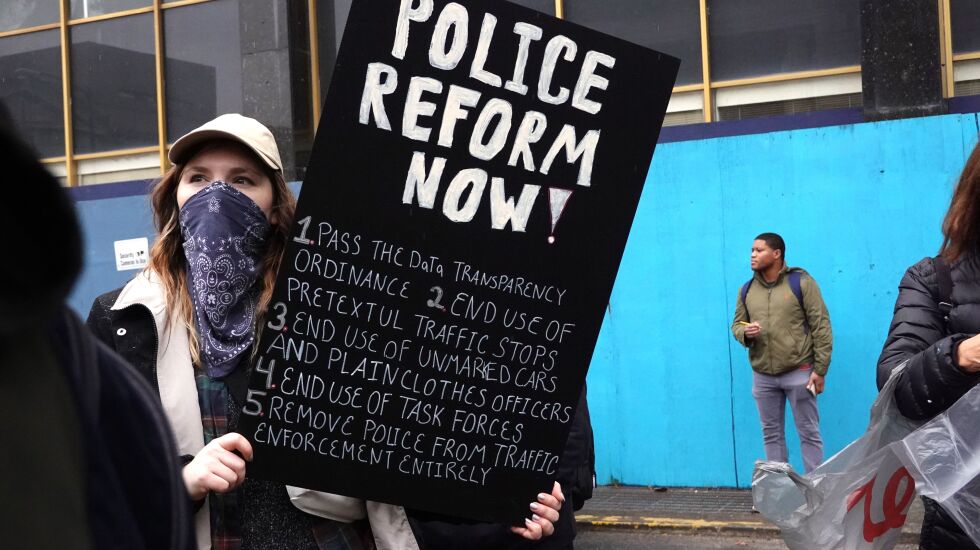
Driving to dinner on Sunday, I found myself suddenly surrounded by emergency vehicles. Fire trucks, police cars and ambulances seemed to converge from all directions. Had someone jumped off the bridge into the river?
I thought of that crush of rescuers when the video of Tyre Nichols’ murder surfaced. What a split screen: On one hand, the total dedication of our public services to saving a life, and on the other hand, the all-too-common contempt for life displayed by other public servants sworn to protect and to serve.
The officers who beat Nichols to death had received training in de-escalation. They had been recruited to diversify the force and they were wearing body cameras. And still they could be aroused to murderous fury merely by someone running away.
Even the emergency medical technicians failed in their duty. They arrived on the scene, saw Nichols handcuffed and propped up against the car, called for an ambulance and then turned their backs and returned to their truck for the 15 minutes it took for the ambulance to arrive. They made no effort to assess Nichols’ status or to render any assistance despite knowing that he had been pepper-sprayed (they may not have known about the vicious beatings). One would suppose that even a suspected killer would be treated more humanely than that.
This should not be possible in a well-ordered society.
Noah Smith offers some timely reform ideas. He notes that the United States lags behind other advanced democracies in the time we devote to police training. In Australia, for example, recruits get 3,500 hours of training. In Germany, they undergo more than 4,000. Yet here the average is about 600 hours — less than is required to become a cosmetologist (3,000 hours) or a plumber (3,500). And when you compare police killings per 10 million people, the United States far outstrips the others, with 28.54 compared with 9.7 in Canada, 6.5 in Australia and 0.5 in the United Kingdom.
Well, some might object, we have far higher rates of violent crime than comparable nations, as well as staggering numbers of guns in circulation. But that makes the case for more and better policing, not for tolerating state-sanctioned brutality. Smith asks: “Is it not common sense that cops who haven’t been properly prepared for the violent and dangerous situations they encounter on a job might resort to escalation dominance and demonstrative displays of aggression because they just don’t know how else to react?”
Philip K. Howard has just published a timely book, “Not Accountable,” about public sector unions. Union power is a key factor, too rarely confronted, in police misconduct (and that of other public employees like teachers). Why are police so rarely held accountable for abusing their power? “The rule in public union contracts requires that prior complaints and infractions be expunged from the record.”
Why is there no national database of cops who’ve been terminated for cause? Union contracts.
Why, Howard demands, is it so hard to convict officers who abuse their power and even murder civilians?
”For police, the procedural trip wires typically include: inability to interview the officer about what happened without advanced notice; allowing the officer to see other people’s testimony first so he can try to align his story; appeal to arbitrators who have been individually approved by the police union; no disclosure of past misconduct to arbitrators unless it occurred recently; several further layers of appeal; again to approved panels of arbitrators; a requirement to keep all evidence and proceedings private, so that the public has no transparency to how the police department is run; and continuing to receive full pay until all appeals are exhausted.”
The Minneapolis Police Department, employer of George Floyd’s killer Derek Chauvin, received 2,600 citizen complaints between 2010 and 2020. Of those, only 12 led to disciplinary action, of which the most severe was a 40-hour suspension. That is no outlier. As Howard recounts, a 2017 Washington Post report examined data from 37 cities and found a dismissal rate of less than two-tenths of 1%.
Howard argues that public sector unions prevent accountability by teachers, police and other key public servants, and thus transgress against the Constitution by hamstringing the authority of presidents, governors, mayors and others who wield legitimate power.
It turns out that there was no attempted suicide on the bridge I was delayed on the other night. It was an accident a couple of blocks north. But I like to think that if it had been what I feared, the response would have been just as vigorous, just as I would like to believe that serious people, confronted with repeated episodes of gross police misconduct, will consider far-reaching reforms.
Mona Charen is policy editor of The Bulwark and host of the “Beg to Differ” podcast.
The Sun-Times welcomes letters to the editor and op-eds. See our guidelines.







